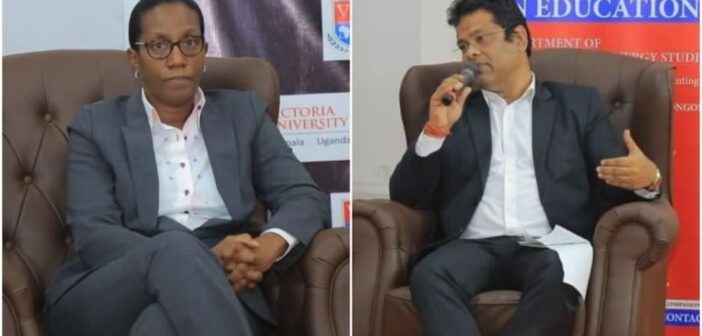Operators in the real estate sector in Uganda have expressed optimism, belief and faith in the industry that they say has been hit hard by the ongoing COVID19 pandemic.
They say that with the economy opening up after the global lockdown, businesses will normalize and players in the sector will be able to make some money and in return offer clients their money’s worth.
This and more were some of the issues that were discussed during a Victoria University webinar held under the theme ‘investment in real estate in the post COVID era’. The mid-morning webinar was broadcast live on Victoria University Facebook and YouTube pages.
Jude Rugasira Kyanda, the Knight Frank Uganda managing director, speaking at the webinar hosted by Victoria University said the real estate sector in the last 20 years has been growing leaps and bounds.
This, she said, has been facilitated by the government infrastructure projects like roads across the country. However, this growth has been put in check by the COVID19 pandemic which shut down economies’ the world over.
Prabhat Mishra, the Crane Management Services general manager, explained that the pandemic came and hit the real estate sector in ways they didn’t expect. “Very many people didn’t know about the pandemic; they didn’t know how they were going to be affected,”
At the time, especially from March when President Yoweri Museveni put the country under lockdown, many landlords and property dealers lost tenants and couldn’t sell properties. Patrick Bitature, Simba Group of Companies chairman, was one of them.
“We had a few tenants leaving our property or give parts of the properties back to us; some requested for rent reduction which we gave to them. We had pressure from employees to reopen the hotel they wanted to be sure that they still had their jobs,” Bitature revealed.
But amidst this disarray, hope reigns. Mishra of Crane Management Services notes that COVID19 might stay for a long time but life has to continue. This means learning to live with the virus and devise ways both landlords and tenants can stay in business.
For Crane Management Services that has over 2000 tenants, a strategy had to be drawn. “We sat down and laid out a strategy. First priority was the life of our tenants, we told them to follow the standard operating procedures (SOPs) – we told them how to stay alive.
“And when the lockdown opened up, we engaged them again. We told them how to stay in business. We gave them a payment plan which they were comfortable with. Yes, we got a big hit, many left but new ones came,” Mishra said.
But despite the pitfalls that came with COVID19, Rugasira is optimistic that the real estate sector will rediscover itself and they will make money. “The real estate business will always remain attractive to invest in, the future is still bright. I would encourage anyone intending to invest in real estate to fast-track what they are doing.
“We have seen a lot of SMEs struggling. Many businesses that rely on day to day interactions with people, with walk-in clients, struggled and now they are looking for rent concessions; some have had to wind down because they didn’t have the cash flow to sustain their businesses. But we have learnt to be frugal and watch our cash flows. This period has presented us with an opportunity for people to revisit their business plans, spending and their overheads.
The increasing population, rural-urban migration provides the market with a steady demand for housing units. At the moment, according to Rugasira, 80% of Ugandans need houses and shelter. This, she says, presents the sector with a huge potential for players to invest and make money.
Dr. Chris Baryomunsi, state minister for housing, said the government has in the recent years provided the legislative reforms need to facilitate the sector to grow. He said the real estate sector is recruitive and will bounce back from the gallows of COVID19 pandemic.



